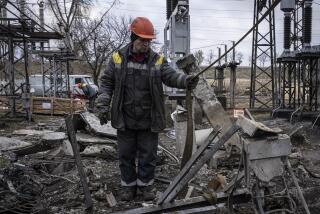Trapped in Deep Freeze, Residents of Small Town in Russia Are Boiling Mad : Energy: Lack of money to pay for heat makes for winter of discontent. Pershino’s plaint echoes across country.
- Share via
PERSHINO, Russia — When the women storm in, full of frost and fury, Valentina Bunina fixes her face in a professional frown. She knows what will follow: tears, moans, anguish and despair.
“When will we have heat?” the women cry, tugging tight their wool scarves.
They shove their way into the tiny town hall, eight of them, then a dozen, then more. “If we could just have a little warmth, just a little . . . ,” one pleads. Another scolds sharply: “We’re dying here! We’re freezing to death! Tell us, how can we survive?”
Bunina has no answers. Her pain shows. Like everyone else in this forest town 50 miles east of Moscow, Bunina stumbles through each day bundled in fur and wool. She wears a hat and coat to her work as assistant town administrator. She snuggles her red-raw hands in the cuffs of a black sweater. And when the women cluster in her frigid office to hurl their hurt at her, Bunina explains again and again: “There’s no money.”
No money for heat. And so, no heat for winter.
Many here have not bathed since the first frosts of November, afraid to catch a chill in the icy water and still icier air. The hospital has shut down. So has the kindergarten. Those lucky enough to have a wood-burning stove can pump the temperature in their homes up to 45 degrees or so. Others get by with makeshift electric heaters that give off as much warmth as a toaster. Brisk walks are no solution--not when the outdoor air dips to 30 degrees below zero.
“Drug us with something so we die faster!” begs Maria Demidova, 68.
“How much can we bear?” Yekaterina Nikitina wails.
As the new year approaches, Pershino’s 2,000 residents feel alone. Yet in truth, their despair echoes across Russia, as massive debts and poor fiscal planning spark one energy crisis after another.
*
In the old days, as Pershino’s residents wistfully recall, the central government took charge of distributing oil, gas and electricity. Now that capitalism has arrived, customers must pay cash in advance, or suffer in the cold and dark. Many end up suffering.
Three-quarters of Russia’s vocational schools lack heat, the Education Ministry reported earlier this month. Some towns have imposed rotating blackouts to conserve what energy they can afford.
Even the military has taken hits. The Black Sea Fleet lost energy supplies and telephone communications briefly this fall. So did a strategic missile test range. And creditors abruptly cut off power to a nuclear submarine base in September, sparking fears of a disastrous meltdown. To avoid future catastrophes, the government passed a law banning fuel companies from cutting off power to military facilities.
No such law protects Pershino.
Here, even the central boiler room has frozen. Busted pipes and wrecked valves lie under snow-dusted boilers. Technician Nikolai Markov estimates that the repairs will take a full month. As for the cost, he doesn’t dare think about it. “My hair stands on end when I consider the numbers,” he said.
Right now, though, the only number that matters is zero. That’s how much money the town has for fuel. The aircraft-parts factory that owns the boiler room has gone bust. It owes the town 600 million rubles in taxes--enough money to pay for five full months of heat. Manager Gennady Kasperovich explains that he cannot come up with the cash until his customers pay him. Grumbling, he sketches a diagram explaining the web of debts that have doomed this town to a most bitter winter.
As he draws, the ink in his ballpoint pen freezes.
The people of Pershino blame their crisis on Moscow’s politicians. The Russian capital is not far off--just a two-hour drive through a fairy-tale forest. But the reforms that boosted Moscow into a bustling, neon-splashed city have yet to hit Pershino. “It’s like we’re living on a different planet,” one resident said.
Hoping to bring back the stability of the Soviet era, many here voted for the Communists in Russia’s recent parliamentary elections. They’re convinced their town would be better off under a command economy.
“Would it be thinkable under the Communists that an entire settlement would freeze out the winter?” Anna Vilkova asked. Answering her own outraged question, she said with assurance: “The Communists would get the fuel here in a matter of two days. They’d replace the damaged pipes in a week.”
Nearly blind at 72, Vilkova spends her days shivering under a pile of robes, shawls, blankets and coats. Her feet are so numb, she said, that she staggers to the bathroom like a drunk. The thermometer in her room reads 46 degrees. “Is this an appropriate temperature for an elderly woman like me, who fought in the war, who toiled hard all her life?” she sputtered. “The authorities no longer need us. . . . That’s why they have left us here, dying in this horrible cold.”
A few blocks down Pershino’s snowy main street, past ugly concrete apartment buildings and bright turquoise wooden homes, ice makes slick the floor of the kindergarten kitchen. Sixth-graders study in coats and hats in front of weak electric heaters. They no longer practice needlepoint or woodworking--their hands are too stiff for crafts.
“Is the 21st century really just four years away?” Marina Shustova, 43, asked. “We cannot believe it, because our living conditions are Stone Age.”
Even the holidays cannot bring relief. Christmas trees abound in the forest, free for the cutting. An open-air market a few miles away sells Santa Claus decorations and cheery paper wreaths. But Pershino’s residents lack the energy for festivities.
Smoke from indoor fires has already damaged many families’ furniture and wallpaper, and bursting radiators have flooded carpets. In some apartments, three generations sleep, eat and work in a single room, hoping their body heat will warm the chill air.
“We’ll celebrate our holidays by stoking wood,” one woman said.
Bunina, the town official, knows the cheerless Christmas is not her fault. Yet, still, she suffers along with the shivering women who crowd her office, hoping for answers, praying for warmth.
“I’m so ashamed,” she said. “I’m afraid to look people in the eyes.”
Alexei Kuznetsov of The Times’ Moscow Bureau contributed to this report.
More to Read
Sign up for Essential California
The most important California stories and recommendations in your inbox every morning.
You may occasionally receive promotional content from the Los Angeles Times.












